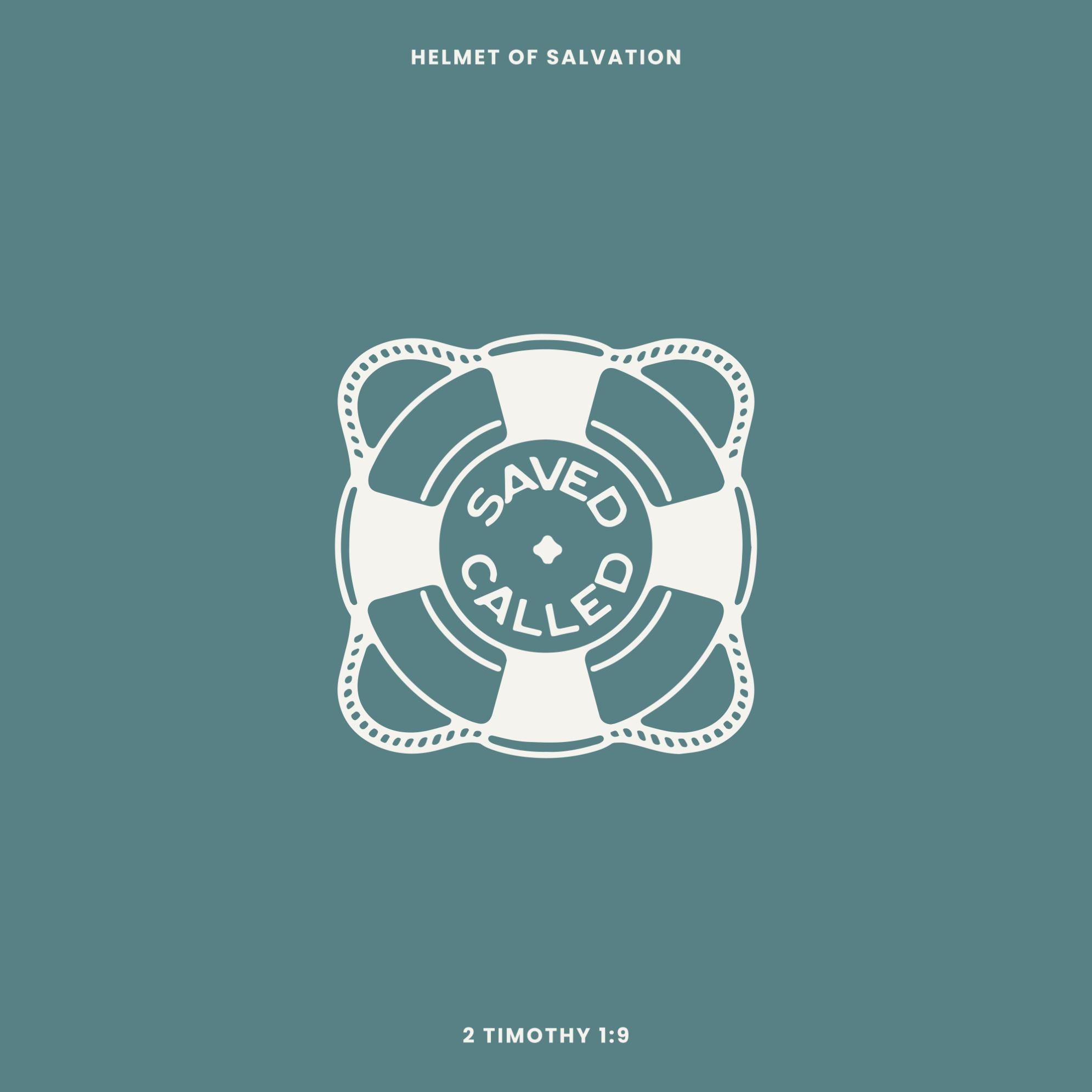2 Timothy 1:9 "Saved & Called" (Helmet of Salvation - Week 2)

![]()
who saved us and called us to a holy calling, not because of our works but because of his own purpose and grace, which he gave us in Christ Jesus before the ages began, (ESV)
He has saved us and called us to a holy life—not because of anything we have done but because of his own purpose and grace. This grace was given us in Christ Jesus before the beginning of time, (NIV)
For God saved us and called us to live a holy life. He did this, not because we deserved it, but because that was his plan from before the beginning of time—to show us his grace through Christ Jesus. (NLT)
Dive Deeper:
Final Words
Last words are lasting words. Maybe you heard William Wallace’s cry for freedom in Braveheart or Spock’s final “live long and prosper” in Star Trek; maybe Beatles guitarist George Harrison’s final words “love one another” deeply resonate with you; or maybe the last words of Stephen in Acts 7 echoes in your heart, “Lord, do not hold this sin against them.” Whether it's a movie, a bible character, or even a person in your own life, our final words carry weight.
Paul writes his last letter to Timothy, his son in the faith, to leave him with encouragement before his execution. Timothy was a young pastor, and Paul had many things to leave him with, one of those being of utmost importance: his holy calling. Paul, on death’s doorstep, writing to his “beloved son,” strongly emphasizes the greatest possible truth: that God “saved us and called us…” Over and over again, Paul encourages Timothy of this stacked truth: the reality that we are saved AND called. You cannot have one without the other. To be saved is to be called, and to be called means you are saved. The mission is not separated from salvation.
The salvation we have received from Christ has now declared our identity and given us a calling. But we must be careful of how we order these and accredit them. The salvation and calling we have is “not because of our works but because of his own purpose and grace, which he gave us in Christ Jesus before the ages began,” meaning it is ours because it was His to give. He is accredited with salvation, and it cannot be taken from us, for it existed before time began. On top of this, God saves individual people to Himself and gives them a specific role to play via their calling. We see this when Paul mentions his calling in verse 11: “For which I was appointed a preacher and apostle and teacher,”. In short, we are saved and called, not by our works but by His plan.
Identity, Callings, and Assignments
Maybe a helpful way to distinguish these things is a tool called the Identity Triangle. This tool is greatly helpful in ordering our identity and reminding us of the foundational truth of our identity in Christ. Imagine a pyramid with three sections. Our identity is at the bottom section, holding up the other two. It is the most important and it cannot change. Because of Christ, our identity is a son or daughter of the living King. No matter how long we live or what happens in our lives, our identity is rooted in Christ. Above our identity is our calling. Along with salvation, we are given a calling for our life. This is where we recognize our abilities and the giftings God has given us. Some are called to be in ministry; some aren’t. Some are called to be teachers, some are called to protect the community, some are called to be creative, and all of us have a call to love others and live generously. Calling rarely changes and is connected with who you are and what God put you here to do. At the top is our assignment: the specific role for the season we are in. Assignments come and go; they change often and look different as seasons pass.
We must never confuse our assignment and call for our identity. The reason identity is at the bottom is because it cannot change. Our assignments will change, and our calling is somewhat fluid in different life stages. If we put any of these two on the bottom, we will begin to view ourselves not in light of the Gospel identity we received but in light of our calling and assignment. When those things fail, we view ourselves as failures. When those things succeed, we rejoice in our own works. These are both destructive ideals. We must always return and live out of our Gospel-given identity and work from it, not for it. Remember the words of Jesus in Luke 10:20: “Nevertheless, do not rejoice in this, that the spirits are subject to you, but rejoice that your names are written in heaven.”
Written by Garrett Belzer
Challenge:
Sit with this question for some time. Does your occupation or the roles that you have in life guide your decision-making and thought processes more than your identity as a child of God? Carefully consider this in honesty. If yes, how might this be affecting you?
2 comments
-
Ja’Lise on
This devotion is on spot! I love the image of the triangle and identity at the bottom! As I journaled about the verse this is also what I came to. I am learning more and more that our identity is the likeness of God and our son separates us from that so salvation restores us to that which was already! Not a new identity but my true identity! I recall David having to remove King Saul’s armor to be true to himself! In this same way I am learning to remove all the armor I put on to fit in and look a certain way! I have definitely fallen prey to letting my occupation or works determine my decisions and even change the way I viewed myself. Like as a singer/songwriter when I haven’t sung or wrote a song I feel like a failure because I placed my calling at the foundation and not my identity.
Again this was good and golden! Thanks Garrett!



This devotion is on spot! I love the image of the triangle and identity at the bottom! As I journaled about the verse this is also what I came to. I am learning more and more that our identity is the likeness of God and our son separates us from that so salvation restores us to that which was already! Not a new identity but my true identity! I recall David having to remove King Saul’s armor to be true to himself! In this same way I am learning to remove all the armor I put on to fit in and look a certain way! I have definitely fallen prey to letting my occupation or works determine my decisions and even change the way I viewed myself. Like as a singer/songwriter when I haven’t sung or wrote a song I feel like a failure because I placed my calling at the foundation and not my identity.
Again this was good and golden! Thanks Garrett!